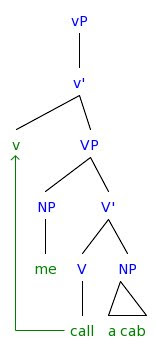As I mentioned last week, there is a cross-linguistic tendency to assign as many consonants as possible to an onset when dealing with a consonant cluster (review: syllables have three parts - the
onset, which consists of the initial consonant or consonant cluster, the
nucleus, which consists of the vowel or diphthong in the syllable, and the
coda, which is the final consonant or consonant cluster; NB: this is a simplified description). The reason for this is two complementary cross-linguistic trends: syllables like onsets, and they don't like codas. These trends are formalized in Optimality Theory as the constraints
Onset (syllables should have an onset) and
NoCoda (syllables should be open).
If these were the only two relevant constraints, there wouldn't be any syllables with codas, because all of the consonants would get piled on the onset of the following syllable. However, other preferences override these constraints in certain situations. Take the word "constraint," for example. The word has the massive "nstr" cluster in the middle. If all we cared about was getting rid of codas, we'd shove all those consonants onto the second syllable, giving a syllabification of
co.nstraint. Go ahead, try pronouncing that. It's not very fun. The reason is that there is another constraint at work here, called sonority sequencing. This refers to the general tendency of onsets to increase in sonority and for codas to decrease in sonority (I'll leave an explanation of sonority for another post, but generally speaking, in order from least to most sonorous, sounds are classified this way: stops < fricatives < resonants < vowels, with voiced sounds being more sonorous than voiceless sounds within each category). In OT this constraint is
Son-Seq (sounds increase in sonority moving from syllable margin to syllable nucleus). In the "nstr" sequence, the n is higher in sonority than the s, which means putting them together in an onset violates sonority sequencing. Since in English
Son-Seq is ranked higher than
NoCoda, we would rather syllabify the word as
con.straint than
co.nstraint.
The reason I'm talking about this at all is from having set our DVR to record the show Good Eats on the food network. The host of the show, Alton Brown (who is also the announcer/narrator for Iron Chef America) has a formidable
NoCoda ranking, and almost always assigns many more consonants to onsets than most of us would ever want to. An example of this is his syllabification of the word "fifteen." I say
fɪf.tʰin, with aspiration on the t because it begins a stressed syllable. However, Mr. Brown says
fɪ.ftin, a syllabification distinguishable from my own pronunciation by the last of aspiration on the t, which signifies that it is not syllable-initial (compare
pʰɪt with
spɪt). This unusual syllabification violates sonority sequencing (remember that stops are less sonorous than fricatives), but he prefers it because it results in only one
NoCoda violation instead of two.
Another example of an extremely high-ranking
NoCoda constraint is the syllabification of a word-final coda with the following word, even in careful speech. I wish I could remember the token Alton produced to make me think of this, but any random example will do. Usually in rapid speech, with a phrase like "farm aid," we say
far.maid, because of the constraint
*Complex (syllable margins should be simple). Our
Align-Morph-R constraints are being violated here, since the first morpheme is being split between two syllables, but in rapid speech we generally prefer violating that to violate
*Complex, which is an articulatory constraint as opposed to a semantic one. However, I noticed that even in careful speech, Alton Brown continually violates
Align-Morph-R, because he would
always rather fulfill phonetic and articulatory constraints over more abstract semantic ones.

